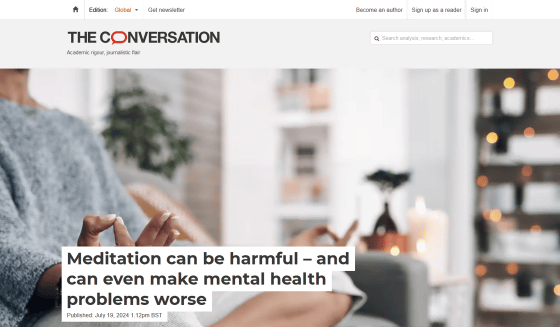What is the dark side of 'mindfulness,' which is said to help reduce stress and relax?

Mindfulness is the practice of 'focusing your consciousness on the experience that is happening in the present,' and in recent years has been incorporated into corporate training and other programs as it is said to have the effects of reducing stress, relaxing, and increasing concentration. However,
Meditation can be harmful – and can even make mental health problems worse
https://theconversation.com/meditation-can-be-harmful-and-can-even-make-mental-health-problems-worse-230435

Mindfulness has its roots in Buddhist meditation, but in Buddhist meditation it is known that in addition to its benefits, there is also the risk of falling into a state known as the ' Makai ,' a general term for negative effects such as hallucinations, auditory hallucinations, and obsessive thoughts.
A 2020 study reviewing more than 40 years of meditation research found that the most common side effects of meditation were anxiety and depression, followed by other negative effects such as mental health problems, delusions, dissociation or depersonalization, and fear.
In addition, a study of 953 Americans who regularly meditated found that more than 10% of participants experienced side effects that had a significant negative impact on their daily lives and lasted at least a month. The negative effects of meditation and mindfulness can appear even in people who have never had a mental health problem before, and even mild meditation can cause side effects.

Of course, there are studies showing that mindfulness has a positive effect on people's mental and physical health, so we cannot dismiss mindfulness entirely. However, the problem that Farias points out is that influencers and coaches who promote mindfulness rarely warn people about the potential negative effects.
In his 2019 book
Mindfulness has already become a $2.2 billion industry in the United States alone, and Farias argued that leaders in the mindfulness industry need to be aware of the negative effects of mindfulness.
Farias also pointed out that the media's coverage of mindfulness is biased. The 2022 study , the highest-funded study in the history of meditation, conducted experiments on more than 8,000 teenagers living in the UK from 2016 to 2018. The results showed that mindfulness has no effect on improving the mental state of children with mental health problems, and in some cases has harmful effects. However, the results of this study were hardly covered in the media.

It is likely that many meditation and mindfulness instructors are not intentionally hiding the disadvantages of mindfulness, but are simply unaware of them in the first place. Therefore, some people who have suffered from the negative effects of meditation may not be believed by their instructors when they complain about the side effects, and may be told that 'if you meditate more, the side effects will go away.'
'Is it ethical to sell a mindfulness app, teach people to meditate, or use mindfulness in clinical practice, and not mention the side effects? Given the evidence of how diverse and common these effects are, the answer should be no,' Farias said. He argued that people should be informed about the harms of meditation and mindfulness.
Related Posts:
in Science, Posted by log1h_ik







